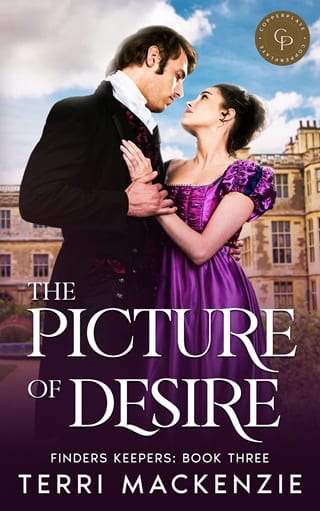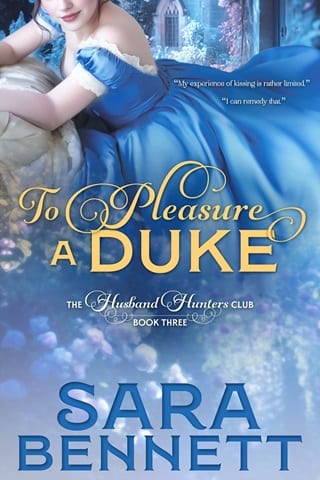Chapter Nine
THE PAST
August 1804
The moment Louisa arrived in Bath, she had every intention of seeking Henry Beaumont out once again. He had been adamant that he would not kiss her, but she was determined to test his mettle. She was eighteen now, a full Season behind her, and she had learnt the art of flirtation as well as any girl of that age might.
He might attempt to resist her, but she knew well all the tricks of the trade. A hand on his arm, a glance up through her eyelashes, a calculated bite of her lower lip. Her Season had given her the ability to flirt, if nothing else, and she was determined that Henry should feel the full force of her newfound skills.
If someone had asked, she would not have been able to say precisely why she was so hell-bent on persuading him to submit to her charms. She might even, given the nature of his resistance, admit to herself and others that it was not a strictly kind thing to do.
In truth, it was the thrill of the chase that excited her. She was young enough that few things had truly been denied. Marriage, for her, was not something she was contemplating as long as her father allowed her to paint at home. Therefore, she had nothing to entertain herself but flirtations, and persuading Henry to flirt would be the biggest victory of all.
A week passed, then two, without seeing him, and she began to wonder whether he was even in Bath this summer at all. Until finally on an expedition to Wells Cathedral, she came across his tall, iron-straight figure on his horse.
Her heart gave a little, wholly inexplicable leap when their eyes met across the street. Her friend Beatrice Lacey had organised the event and was waving at everyone from atop her spirited mare. Behind Louisa, her groom (the reason she had been permitted to go on this trip) was perched behind her.
"You may go," she said imperiously, hoping her tone would be enough to persuade him. "I will collect you on my return."
"I'm afraid I can't do that, miss. Your mother gave me strict orders, and I'd be dismissed if she ever found out."
Disappointed but unsurprised, Louisa sighed and nodded. "Very well. Don't ride too close." Then she squared her shoulders and trotted across to where Henry was waiting. "Good morning, Lord Eynsham," she said, giving him a smile she had been told on countless occasions was alluring. "What brings you out of the house? I haven't seen you at a single ball or rout this summer, Lord Eynsham."
His brows rose. "You were looking for me?"
"Is that so surprising?"
"I would have thought you had more than enough admirers to satisfy you."
She preened, glorying when the corner of his mouth dimpled like he was attempting to suppress a smile. "Does that mean you count yourself among their ranks, perchance?"
"I would hardly say that," he said, but he glanced at her before encouraging his horse into a walk after Beatrice Lacey.
"What would you say? Have you been avoiding me?" She caught up and rode by his side again. Their party was sizeable, another reason her mother had agreed she could go, and the other members were too busy talking amongst themselves to listen to her conversation. "Is that why I haven't seen you?"
"Why would I be avoiding you?"
She fluttered her eyelashes at him in an overwrought gesture calculated to make him laugh. It succeeded, and she felt another flush of victory. "Perhaps because you fear how much you like my company?"
"Is that so," he said, amused.
"Well, do you have a better reason?"
"How about that I arrived in Bath yesterday," he said. "Is that reason enough?"
"Yesterday? But you have wasted half the summer."
The humour left his face and his mouth turned into a hard line. "I was at my family estate."
Louisa rode beside him in silence, frowning at this new nugget of information he had offered her. "Do you not enjoy it there?" she ventured at last.
"My father and I . . ." He hesitated. "We have a strained relationship."
"Oh." Louisa knew little of his father except that he was penniless and her mother did not want an association, but he had mentioned their troublesome relationship once before. "I'm sorry."
"There's nothing to be sorry about. How has your summer fared?" His mouth tipped up into that half smile she adored so much. "I assume you've been tripping over admirers?"
"A lady never tells." She sent him a coquettish pout. "And you? Do you still hold fast to your vow of chastity and moral superiority?"
"A gentleman never tells," he returned, and she laughed, turning back to the front. Who would have thought that a young man with such staid and old-fashioned values would have a sense of humour?
"Remind me why you have taken such a vow?" She turned back to him, genuinely curious. "You are not like any other young gentlemen I have met." All of whom enjoyed drinking, cards, and female company. "You have gained a name for yourself as a man who adheres rigidly to his values, which naturally is admirable, but I simply cannot conceive why."
His smile was gentle. "I wouldn't expect you to understand."
"Why? Because I am nothing more than a shallow flirt?" She tossed her head, abruptly irritated. "Don't treat me like a child."
There was a silence as they came to the outskirts of the city. Louisa considered cantering ahead to talk with someone else when Henry said, "It's because I don't want to be like my father." His eyes were fixed on his reins as he said it, and she had the feeling he had never confessed this aloud before. "He destroyed our family by doing all the things I've vowed not to." There was a new harshness to his face. "When I marry, my family will not wonder if I will return home. My wife will not be humiliated because I parade my mistresses across town. My children will not be left to wonder if they will have anything left to inherit—or even if they will be granted the chance to live in their house come next year." He snapped his jaw shut, and Louisa forgot her irritation in the face of his pain. "It is not something you can understand, Louisa, because you've not had to live it."
For the first time, she saw herself as he must see her: a silly, airheaded girl whose thoughts were of beaus and conquests and flirtations. A girl who repeatedly toyed with him and pushed at his boundaries because they did not align with her own.
"I cannot change his actions," he said, his voice low, "but this is one thing I can control. And I must control something, Louisa, or I will go mad."
Henry Beaumont, the man who never, and all because his father was the man who always.
It was an extreme reaction, but she understood it, a little.
"Would moderation hurt?" she asked.
"And if I am not capable of moderation? My father clearly isn't. Better I never have to find out how low I can sink."
"Your self-control is admirable," she murmured.
"It's a necessity. Survival." He hesitated as he glanced at her. "I likely will inherit very little, if anything at all. His behaviour won't be curbed. And I must have something."
"I understand." She cocked her head as she observed him, wondering if he would balk at her confession. After all, Society as a whole disapproved—or it would, if it knew. "I am not certain I ever want to marry."
His brows rose. "Because of your painting?"
"You remembered?"
He glanced at her. "I remember everything," he said, and the tone of his voice made something warm and liquid erupt in the base of her stomach. "You told me you aspire to become one of the great painters."
"I'm learning," she said, struggling to find her ability to speak under the unsettlingly hot weight of his attention. "My father has hired me a tutor, and I am spending all my free time practising. If I were to marry, my husband would control whether I continued to paint, and he would almost certainly disapprove of my oils."
Henry surveyed her with unwarranted seriousness. "You love it enough to sacrifice marriage for it?"
"How much of a sacrifice truly is marriage? Particularly when I have no interest in it." She sighed wistfully. "When I have a paintbrush in my hand, I feel as though I am free. What man can grant me freedom?"
His gaze sharpened, and she felt his need to understand as though it were painted onto his skin. "Is that what art is to you? Freedom?"
"Do you not feel it too?" she asked earnestly. "Have you never seen something and been touched by it? Not merely by what it's representing, but the skill it has taken to reproduce something of that magnitude? It's one of the lenses through which we view history. It brings the world around us alive through the painter's eyes. Through my painting, I can convey things I could never explain through words alone. I am more than the sum of my parts. More than I could ever be alone."
Henry said nothing, and she flushed. Usually, she was so careful to keep her opinions locked safely down, but she had forgotten herself. Something about him made it all too easy to be honest, and honesty was one thing she had learnt one should never have too much of. The truth was potent, and if she gave too much of it away, it was akin to cutting her soul into pieces and dispensing the remains.
"I'm sorry," she said, flashing him a brilliant smile. This was why she only ever flirted when she was in public. Talking of serious matters invited in danger. "We can discuss something else. You have a remarkably good seat on your horse, Lord Eynsham. Are you a frequent rider?" She took her bottom lip into her mouth, glancing up at him through her eyelashes. "You will have to teach me one day. I ride but infrequently."
"No," he said quietly. "Don't hide yourself from me, Louisa."
She took a fortifying breath. "I'm sorry, my lord. I don't quite understand your meaning."
"That was beautiful, everything you said." There was an expression in his eyes she didn't know how to interpret. None of her other suitors had looked at her like that before, like he had just seen something new and entirely fascinating. "I would like to see some of your artwork sometime, if you would allow me to."
"I—" She shook her head and frowned. "You wish to see it?"
"How could I not after that impassioned speech?" That crooked smile took her breath away once more. "Please?"
"If you feel the same way when we are both next in London, I will show you."
"Thank you. I would like that very much."
"You should be careful," she said, keeping her tone light and giving him a coquettish smile. "You're making me believe you mean it."
He held her gaze, and Louisa was aware, with her artist's brain, that she found something about the juxtaposition of this man inordinately compelling. "I hope you will come to learn," he said, not looking away, "that you can trust everything I tell you."
 Fullepub
Fullepub 



